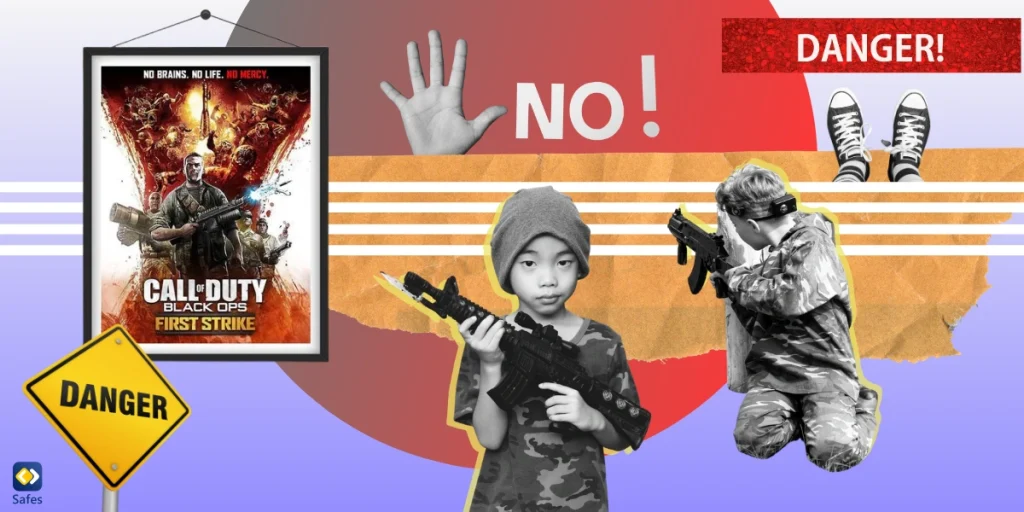Within the ever-changing realm of video games, the Call of Duty franchise is a huge hit. Many parents are unsure if their children should play this popular game because of its realistic graphics, thrilling action, and engaging gameplay. We’ll dissect Call of Duty in this article to assist parents in determining the answer to this question: Is Call of Duty safe to play?
What is Call of Duty?
Call of Duty, a widely embraced video game franchise categorized under the first-person shooter (FPS) genre, is developed by diverse studios under the umbrella of Activision. Recognized for its authentic and immersive portrayals of military combat scenarios, it becomes crucial for parents to grasp the fundamental aspects of Call of Duty when making decisions about its suitability for their children.
Games within the Call of Duty series commonly include a single-player campaign mode characterized by a narrative-driven storyline, enabling players to partake in various military missions. The primary goal involves overcoming challenges, solving puzzles, and engaging in combat scenarios. Additionally, the multiplayer mode plays a significant role, providing players with opportunities to compete against others online across various game modes, cultivating a dynamic and competitive gaming experience.
A distinctive quality of Call of Duty lies in its dedication to realism, evident in both graphics and gameplay mechanics. Striving to replicate genuine military environments, weapons, and tactics, the game features realistic graphics that may encompass intense scenes of violence, gunfire, and explosions, contributing to its mature rating. Parents should remain cognizant of the visual content their child may encounter during gameplay, assessing whether it aligns with their family values.

Call of Duty’s Age Rating
Video games, including the Call of Duty series, are given age ratings by the Entertainment Software Rating Board (ESRB). These classifications, which include “Mature” (17+) and “Teen” (13+), offer suggestions on the suitability of the material for certain age ranges. Call of Duty games are always given a mature rating. So, it is not safe to play older Call of Duty games for children.
In addition, the ESRB offers content descriptors that contribute to the total rating by emphasizing certain features like profanity, violence, or suggestive themes. These ratings and descriptions are helpful resources that parents can use to decide whether a specific Call of Duty game is appropriate for their child.

How Does ESRB Rate Games?
The self-regulatory Entertainment Software Rating Board (ESRB) is in charge of determining the age and content ratings of video games that are sold in the US and Canada. The main goal of the ESRB rating system is to provide consumers—parents in particular—with important information about the content and age appropriateness of video games. This is a quick rundown of how the ESRB determines game age ratings:
Submission by Developers
For a rating, publishers or creators of video games submit their works to the ESRB. A comprehensive questionnaire covering a range of game content features, including violence, profanity, sexual material, and substance use, is included with this submission.
Rating Board Evaluation
A team of trained raters at the ESRB reviews the submitted material and plays the game to assess its content. The raters consider factors such as the context of the content, intensity, frequency, and its impact on the overall game experience.
Assignment of Rating
Based on the evaluation, the ESRB assigns one of the following age and content ratings:
- Early Childhood (EC): Suitable for ages 3 and older.
- Everyone (E): Suitable for all ages.
- Everyone 10+ (E10+): Suitable for ages 10 and older.
- Teen (T): Suitable for ages 13 and older.
- Mature (M): Suitable for ages 17 and older.
- Adults Only (AO): Content is only suitable for adults ages 18 and older.
- Rating Pending (RP): Indicates that the game has been submitted to the ESRB and is awaiting a final rating.
Content Descriptors
The ESRB adds content descriptors in addition to the age rating to give more precise information about the particular content that went into the rating. material descriptors encompass several components, including but not limited to violence, vulgarity, and sexual material.
Consumer Information
The assigned rating and content descriptors are displayed prominently on the game’s packaging, helping consumers make informed decisions about whether the game is suitable for themselves or their children.
Online and Digital Platforms
The ESRB rating system extends to digital and online platforms. Games available for download or purchase online are required to display the assigned rating and content descriptors. This information is typically presented on digital storefronts and during the online purchasing process.
Using Parental Controls for Call of Duty
Parental controls are an essential tool for parents who want to manage and monitor their children’s gaming experiences, including those with Call of Duty titles. Here’s a guide on how parental controls can be utilized for Call of Duty:
Console-Specific Controls
Both major gaming consoles, such as the PS4, PS5, and recent generations of the Xbox, offer parental control features that can be customized to restrict access to certain features and content. These controls are usually accessible through the console’s settings menu. Parents can set up user accounts for their children and apply age-appropriate restrictions. Parental controls on consoles can help protect your child since Call of Duty is not safe to play on consoles.
TV Parental Controls
Some monitors and televisions have specific parental control settings that help with setting limits on your child’s screen time. This method can only help with limiting your child’s screen time playing Call of Duty and doesn’t actually block the game altogether. Though if you put a password on your smart TV, you can effectively block your child’s access without your supervision. Check out our blog to find the parental control settings of the Smart TV you have at home.
Using Safes
Using a third-party parental control app like Safes can be helpful especially if your child is playing Call of Duty on their PC or through a third-party device such as a mobile phone. In these cases, Safes can help you limit their screen time, block their apps entirely, or filter URLs. Since Safes is a parental control app it can help with other things too, for example, you can track your child’s location as well. Safes is available for download across multiple platforms including iOS and Android as well as on Windows and MacOS. Ensure your child’s safety while playing popular games like Call of Duty. Start your free trial with Safes to monitor and manage their gaming activities.
Conclusion: Is Call of Duty Safe?
It’s clear that parents need to be proactive in managing their children’s gaming experiences. The Call of Duty series is meant for adults and should not be played by children, but ultimately, the choice is in parents’ hands. The detailed insights into the game’s content, the ESRB rating system, and the practical use of parental controls provide a roadmap for parents. Understanding what Call of Duty entails, its commitment to realism, and the mature themes it often features is key. The ESRB ratings act as a handy tool, giving a quick overview of a game’s appropriateness for different age groups. Additionally, parental controls, whether through gaming consoles or third-party apps like Safes, offer practical ways to set limits and keep an eye on what your child is exposed to during gaming sessions. By combining awareness, rating knowledge, and control tools, parents can better navigate the complexities of gaming and ensure a safer gaming environment for their kids.




